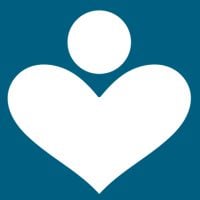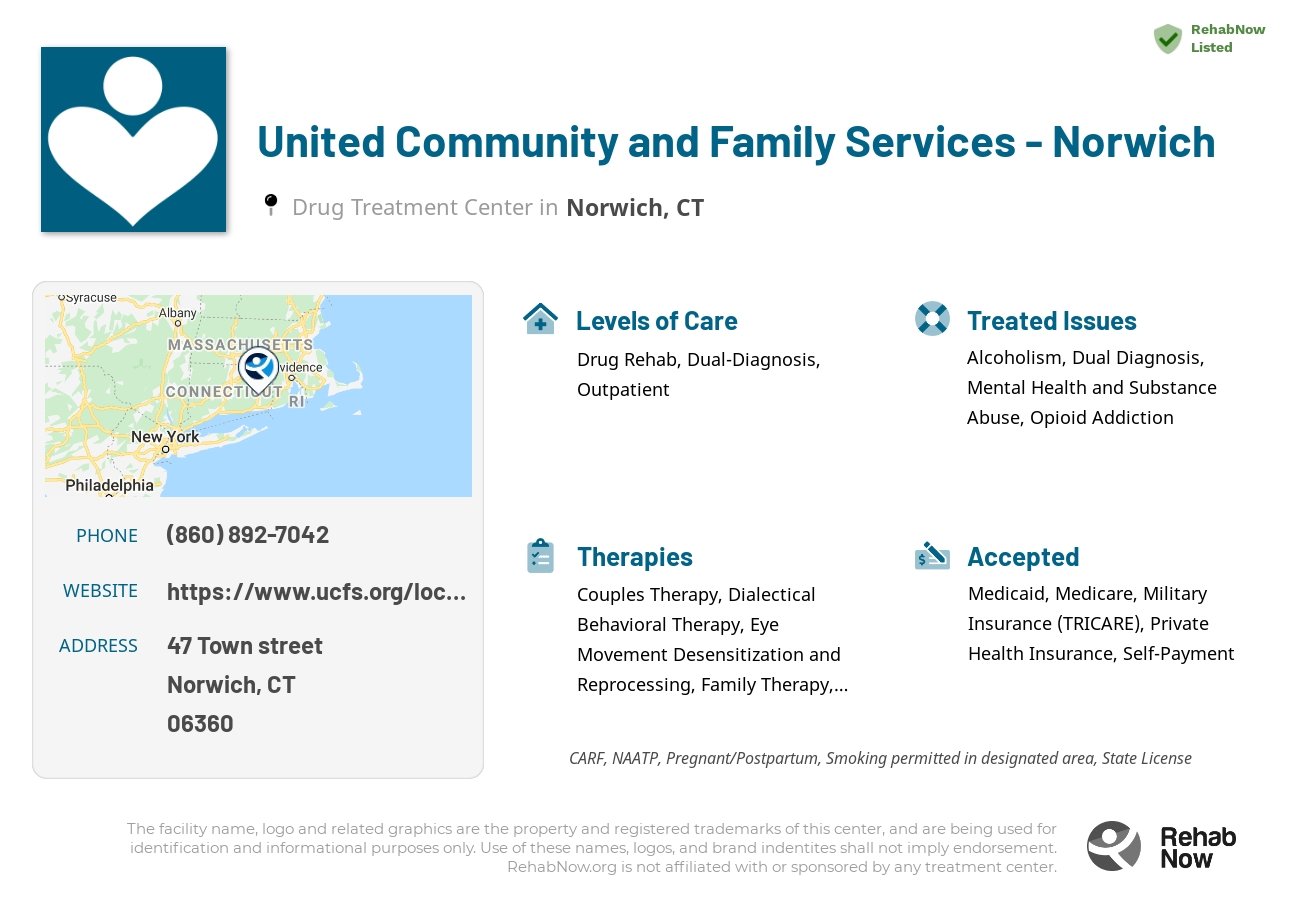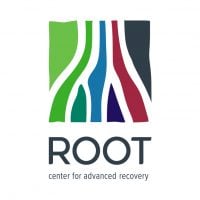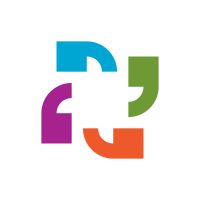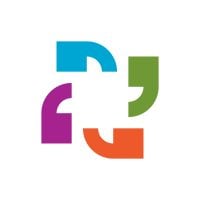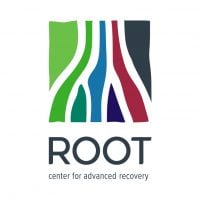United Community and Family Services - Norwich
Drug Rehab Center in Norwich, Connecticut
United Community and Family Services - Norwich, Connecticut, is a nonprofit licensed community mental health agency that provides comprehensive behavioral health services for both adult and child populations, including addiction and substance abuse treatment and ongoing support services.
About United Community and Family Services - Norwich in Connecticut
United Community and Family Services - Norwich is a nonprofit licensed community mental health agency located in Norwich, Connecticut. Established in 2010, the agency provides comprehensive behavioral health services including integrated care for children and families, physical health and wellness, addiction and substance abuse treatment, case management, psychiatric care and outreach. They serve both adult and child populations in the Greater Norwich area.
At United Community and Family Services - Norwich, they provide a wide range of quality services for those struggling with addiction and substance abuse. These include individual and group counseling, medication management, case management, short-term and long-term residential treatment, sober living, relapse prevention and aftercare services. They are committed to helping their clients develop and maintain successful recovery plans and offer ongoing support services to ensure their clients have the necessary resources to maintain lasting sobriety.
United Community and Family Services - Norwich is accredited by The Joint Commission and is also a member of the Connecticut Coalition for Children and Families. They have also earned numerous awards and recognition, including the 2016 National Council for Community Behavioral Health Quality Award. The agency is dedicated to providing the highest quality of care and is committed to offering compassionate, culturally sensitive, and effective treatment plans to their clients.
Genders
Ages
Modality
Additional
Conditions and Issues Treated
Opioids are a group of drugs that include substances such as heroin, morphine, and oxycodone. These drugs activate opioid receptors in the brain, which produce pleasurable feelings. Opioid addiction occurs when drugs are abused at increasing rates or increasing amounts because the body becomes tolerant of them.
Opioid addiction is typically diagnosed when drug abuse becomes a typical behavior that interferes with an individual’s ability to function daily. The use of the substance results in consequences like legal problems.
Treatment for opioid addiction varies depending on each individual’s needs. Some treatments focus on replacing opioids with other drugs that have similar effects of reducing withdrawal symptoms. Other treatments aim to reduce the risk of relapse by providing psychological support or using more natural methods.
A drug rehab center that uses Dual Diagnosis is more likely to be successful in rehabilitating a person. Dual diagnosis helps to identify and treat any co-occurring disorders. It is essential to screen for both addiction and any untreated mental health issues. A dual diagnosis gives rehab the means to treat addiction while restoring mental and emotional health.
About 70% of patients with drug addiction have at least one other psychiatric diagnosis. Fortunately, dual diagnosis treatment is a proven model that has been highly effective.
Levels of Care Offered
This center offers a variety of custom treatment tailored to individual recovery. Currently available are Drug Rehab, Dual-Diagnosis, Outpatient, with additional therapies available as listed below.
Outpatient programs offer a lower intensity level of addiction treatment than inpatient facilities. They are ideal for those who have graduated from inpatient facilities, have a supportive home environment, and are motivated to commit to the program. Services offered include medication-assisted treatment, individual and group therapy, and peer group support.
This treatment is a popular option for those suffering from a lower intensity addiction. It is not advisable for someone who needs to go through a medically supervised detox or does not have a supportive home environment. It requires motivation and dedication to commit to the program without constant monitoring.
Therapies & Programs
During individual therapy at United Community and Family Services - Norwich in , the person in recovery meets with a therapist one on one to go over their situation and learn from past mistakes. The counselor or therapist will use this time to address the causes of addiction, triggers, and any mental issue or dual diagnosis. They will also address aftercare plans, giving them the best chances of long-term sobriety.
This therapeutic process is very intense and challenging to go through. Some clients may find it easier to open up with someone apart from their family or loved ones who understand their struggles and experience with addiction.
The process of going through couple’s therapy at United Community and Family Services - Norwich in allows for both partners to be on the same page regarding addiction recovery. Whether one or both members of the couple struggled with addiction, they can improve their odds of sobriety by undergoing this treatment together. This therapeutic environment teaches how to communicate effectively and avoid relapse triggers while building healthy lifestyles that may help maintain sobriety following graduation from rehab programs.
Family therapy is designed to help addicts get clean and sober by using what they love the most; their family. Most drug treatment centers make it mandatory that the addict’s family attend therapy sessions, which is great because having everyone there to support them makes it much easier for them to get clean. Not only are they surrounded by people who want them to get better, but everyone is there because they want the best for them, not because they feel like they have to be.
Drug addicts are often surrounded by resentful or uneducated family members who would, at times, rather see them stay addicted because it makes their own lives easier. Sometimes they don’t understand what the addiction is or how they play a part in it. They know that during and after the addict’s sobriety journey, they will face challenges and changes that they aren’t sure how to handle. This can be very tough for an addict to go through on their own, which is why it’s so important that they have the support of their family. Just because someone is an addict does not mean that they don’t deserve the love and support of those around them.
Addicts in Norwich, CT can find support in group therapy at United Community and Family Services - Norwich by finding peers who understand their situation and being held accountable. They also learn to develop faith, understanding, and insight into their addiction through shared conversations.
Group Therapy is employed by drug treatment centers to provide the recovering addict with a platform to talk about their feelings and experiences. It also provides for an opportunity to learn from other addicts who have successfully overcome their addiction. It is recommended that all group members be recovering addicts for this type of therapy to work.
Trauma therapy allows people who struggled with a past trauma to face the situation and learn from it. Many people go through traumatic events at an early age that later leads them into addiction as adults. By addressing this issue during treatment at United Community and Family Services - Norwich in [/type], you can move forward with your recovery process and take back control of your sober future, too!
Traumas are one of the most common causes of psychological disorders such as Addiction Disorder. It’s often found among those diagnosed with Addictive Disorders because traumatized individuals have strong emotions or thoughts related to their traumas, leading to addictive behaviors.
Dialectical behavior therapy (DBT) is a cognitive-behavioral therapy that focuses on eliminating specific negative thoughts, such as suicidal thoughts. These negative thoughts can potentially lead to an individual inflicting self-harm. It helps treat patients exhibiting uncontrollable emotions, intense mood swings, and borderline personality disorders.
The term “Dialectic” means the integration of opposites. In substance abuse, DBT refers to accepting the patient’s addiction and working to change their thoughts and behavior. It improves life skills such as controlling intense emotions without reacting impulsively, resolving interpersonal conflicts effectively, and promoting awareness about self and others.
Cognitive Behavioral Therapy (CBT) helps addicts comprehend the causes of their substance abuse and the consequences that follow. The treatment’s goal is to help addicts gain self-control and maintain abstinence from drugs and alcohol over the long term. Through CBT, clients learn to recognize and avoid high-risk situations and cope with challenging situations when they arise.
Eye movement desensitization and reprocessing, or EMDR, is another therapeutic technique typically used for addiction recovery. This type of therapy works by stimulating brain activity to help the addict process past emotions without relapsing on their drug of choice.
EMDR can be particularly effective for recovering addicts who have trouble recalling the events that lead up to their addiction. By helping the addict recall these memories under safe conditions, this therapy can help reduce their risk of relapse during difficult moments.
Payment Options Accepted
For specific insurance or payment methods please contact us.
Is your insurance accepted?
Ask an expert, call (888) 674-0062
United Community and Family Services Associated Centers
Discover treatment facilities under the same provider.
- United Family and Community Services (UCFS) - Norwich Health Center in Norwich, CT
- United Community and Family Services (UCFS) - Plainfield Health Center in Moosup, CT
- United Community and Family Services - Moosup in Moosup, CT
- United Community and Family Services - Adult Outpatient in Colchester, CT
- United Community and Family Services - New London in New London, CT
Learn More About United Community and Family Services Centers
Additional Details
Specifics, location, and helpful extra information.
Norwich, Connecticut 6360 Phone Number(860) 892-7042 Meta DetailsUpdated November 25, 2023
Staff Verified
United Community and Family Services - Norwich Patient Reviews
There are no reviews yet. Be the first one to write one.
Norwich, Connecticut Addiction Information
Connecticut has a higher rate of substance abuse and addiction than the national average. The state ranks in the top 10 in the country for illicit drug dependence among those ages 18 to 25. In 2010, there were 9,211 people admitted to an alcohol treatment facility for alcohol abuse combined with a secondary drug. Connecticut ranked fifth in the United States of America for the number of fatalities involving drunk driving in 2014.
9.4% of Norwich residents reported past-month illicit drug use. The most commonly used drugs in Norwich are marijuana, cocaine, and heroin. In 2014, there were 10 drug overdose fatalities in Norwich, CT, which is a rate of 11.8 per 100,000 residents. People with drug problems are more likely of contracting diseases like Hepatitis B. A good way to start looking for treatment is to ask someone who has been through treatment before.
Treatment in Nearby Cities
- Durham, CT (30.9 mi.)
- Avon, CT (42.3 mi.)
- Branford, CT (41.8 mi.)
- New Milford, CT (68.2 mi.)
- Norwich, CT (1.8 mi.)
Centers near United Community and Family Services - Norwich
The facility name, logo and brand are the property and registered trademarks of United Community and Family Services - Norwich, and are being used for identification and informational purposes only. Use of these names, logos and brands shall not imply endorsement. RehabNow.org is not affiliated with or sponsored by United Community and Family Services - Norwich.
